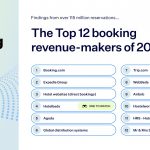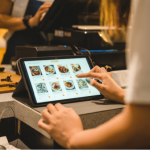Business intelligence (BI) software has revolutionized the hospitality industry, handing professionals the tools they need to turn mountains of business data into useful, actionable insights.
NB: This is an article from Solonis
However, despite its versatile applications, many hotels restrict its usage to forecasting occupancy rates. While this has been a reliable tactic in the past, COVID-19 dramatically altered the industry landscape. Because 2020 and 2021 were such outlier years in hospitality—and nearly every other sector—predictive analytics that look to the past few years as a benchmark aren’t dependable.
Subscribe to our weekly newsletter and stay up to date
As hospitality continues to experience bouts of uncertainty throughout the recovery and guests continue to practice new travel behaviors, historical data remains unreliable. To safeguard their bottom line, hotel owners and operators need to diversify their revenue streams. This is where BI software can help. By analyzing other sources of business data, BI can spot guest trends, identify opportunities in amenities and services, and even optimize operations.
Capitalize on Personalization Through Guest Segmentation
Personalization is the name of the game for consumers. From online shopping to paid experiences, customers want to be treated as individuals with their own unique tastes when it comes to the brands they interact with. BI can boost personalization efforts and identify guest trends using customer segmentation.
For example, data indicates that domestic travel remains high. Short trips often result in short stays, but guests staying closer to home are also more likely to take more trips. They might be inclined to spend more on services or upgrades because they don’t spend large portions of their travel budget on airfare or rental cars. Hoteliers can check this trend using BI to filter guests by geography and analyze their spending. From there, hotel staff can serve guests with relevant offers and upgrades.
Leveraging customer segmentation capabilities, properties can uncover which guest segments typically book the shortest stays or spend the least. Armed with this knowledge, marketing and sales teams can do a deeper analysis of the group’s behavior and craft strategies to increase guest spending or reservation length—all driving the bottom line.
Look for Revenue Opportunities Beyond the Room
While room occupancy and reservations are primary drivers of hotel revenue, they are not the only revenue streams available. Along with attracting guests, amenities can generate a decent amount of revenue on their own. And connecting point-of-sale systems to customer behavior through a BI platform can open a realm of potential opportunities.
Hoteliers can cross-reference amenity purchases with customer segments to see what sells best to different groups. Groups of a certain size might be more likely to reserve poolside cabanas or book spa services. Guests with longer stays might be more likely to upgrade their rooms. Hoteliers can take these insights and create personalized offers, incentivize upgrades, or use them as loyalty reward offers.
Hoteliers and staff can also analyze amenity data to spot bestselling items and services. These can be leveraged as upsells, used in bundled offers to promote sales around a specific period or act as a reminder to keep the items in stock.
Optimize Labor and Resources
BI software can increase operational efficiency as well. These platforms make data accessible and provide a holistic view of operational data so hotel managers and staff can make the most informed decisions when it comes to staffing, inventory, and reservations. From operational costs to guest preferences, hotels collect a wide range of data from around the property. However, many hoteliers aren’t using the data to its fullest potential, particularly when it comes to labor and resource optimization.
One way to leverage data is to compare upcoming reservations against inventory supplies to help managers make more thoughtful decisions around ordering. The same principle can be applied to maintenance work and scheduling it around times of lower occupancy, inconveniencing fewer guests.
Ultimately, BI will either confirm your existing operations strategy or highlight the shortcomings and areas for improvement. When it comes to operational, labor, and resource costs, the more data points you have, the better.
Adjusting to New Guest Expectations
The use of occupancy forecasting through historical data is not gone forever, but it will take time to recover the relevance it once had. Hotel managers who already have BI software at their disposal should be challenged to think more creatively about its use and ability to drive property revenue. Hoteliers who haven’t invested in a BI solution should seriously consider it as the industry continues to emerge from the pandemic landscape and caters to new guest expectations. The pandemic may have caused a massive shift in travel trends and guest behaviours, but this is not the first time the hospitality industry has risen to the challenge of rapid change.
Three Ways to Get the Most Out of a Business Intelligence Tool
BI is a powerful tool with a wide range of applications, integrations, and information presentations. It can be easy to feel overwhelmed by the technology, but there are a few best practices to help hoteliers yield the largest impact and best business data:
Focus on analyzing data that supports specific business goals. It is easy to get lost in the sea of generated data or become buried in a pile of analytical insights. Set clear goals and metrics you want to measure, and then craft a strategy that helps you achieve these goals. For example, your goals might include increasing guest personalization, boosting revenue outside reservations, and optimizing operating costs.Lean on integrations. BI can only analyze data connected to the platform. Systems that do not integrate will need to have their data manually uploaded. This is not ideal because it will result in duplicate data and increases the risk of human error. Today, many platforms utilize an open application programming interface (API) to integrate seamlessly with other platforms already being used. When researching BI technology partners, that’s one thing to consider.Take BI beyond marketing and sales. While the benefits for sales and marketing are significant, BI can be used in many applications and functions. All hotel managers should be trained in its use and be given access to the appropriate data to search for opportunities for improvement within their department.
Read more articles from Solonis
The post How to Diversify Hotel Revenue Using Business Intelligence appeared first on Revenue Hub.
































